University Management Assignment: Leadership and Motivation
VerifiedAdded on 2019/10/31
|23
|6275
|34
Homework Assignment
AI Summary
This assignment delves into various facets of leadership and management. It begins by exploring Henry Fayol's 14 principles of management and Henry Mintzberg's managerial roles, examining interpersonal, informational, and decisional roles. It then discusses managerial skills, the planning process, and rational decision-making models. The assignment also covers traditional goal setting, MBO, and behavioral leadership theories, including trait and contingency theories. Furthermore, it examines transactional and transformational leadership styles, motivation theories (content and process), and the Maslow hierarchy of needs, along with the equity theory. The document provides a detailed overview of these concepts, offering valuable insights into effective leadership and management practices.
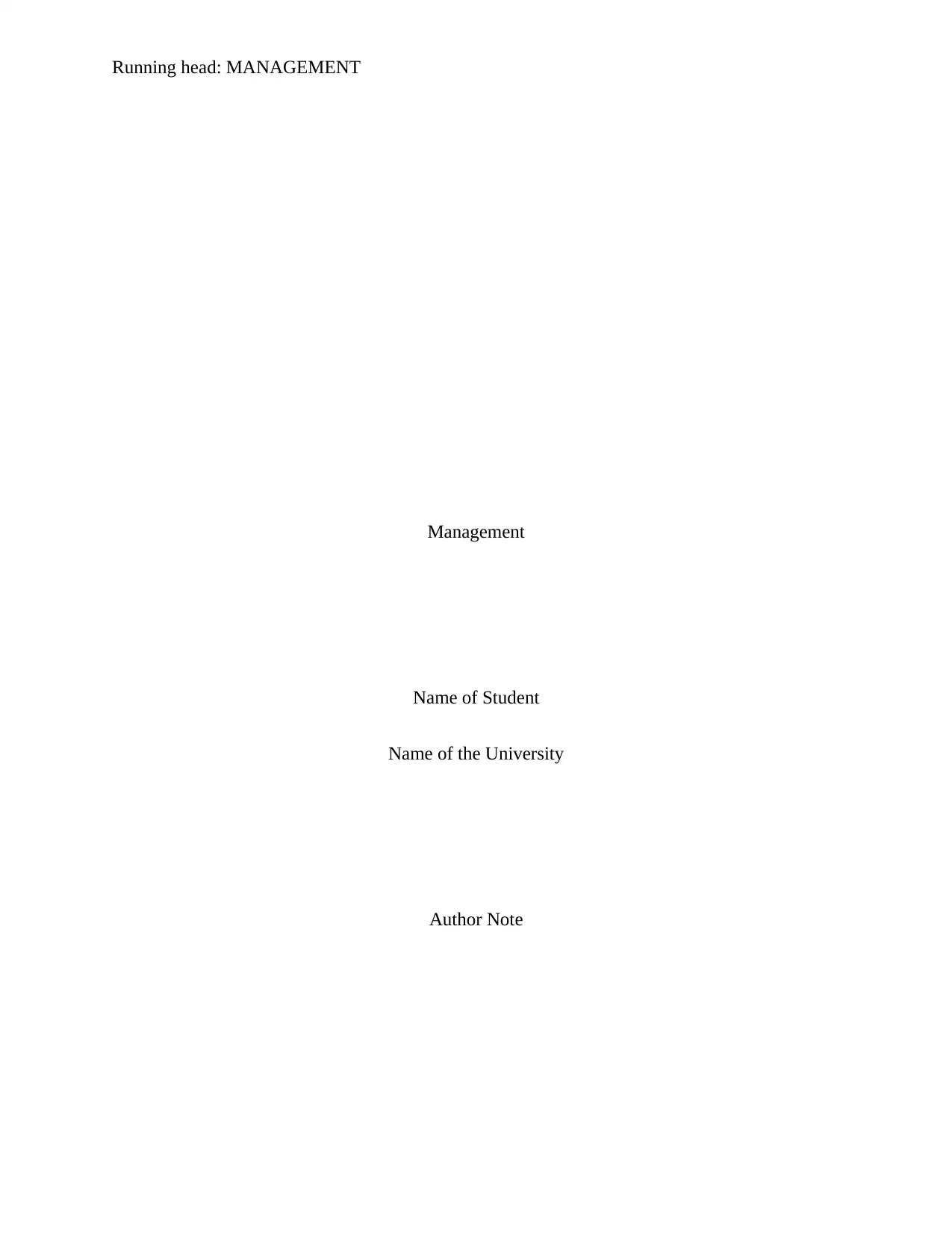
Running head: MANAGEMENT
Management
Name of Student
Name of the University
Author Note
Management
Name of Student
Name of the University
Author Note
Paraphrase This Document
Need a fresh take? Get an instant paraphrase of this document with our AI Paraphraser
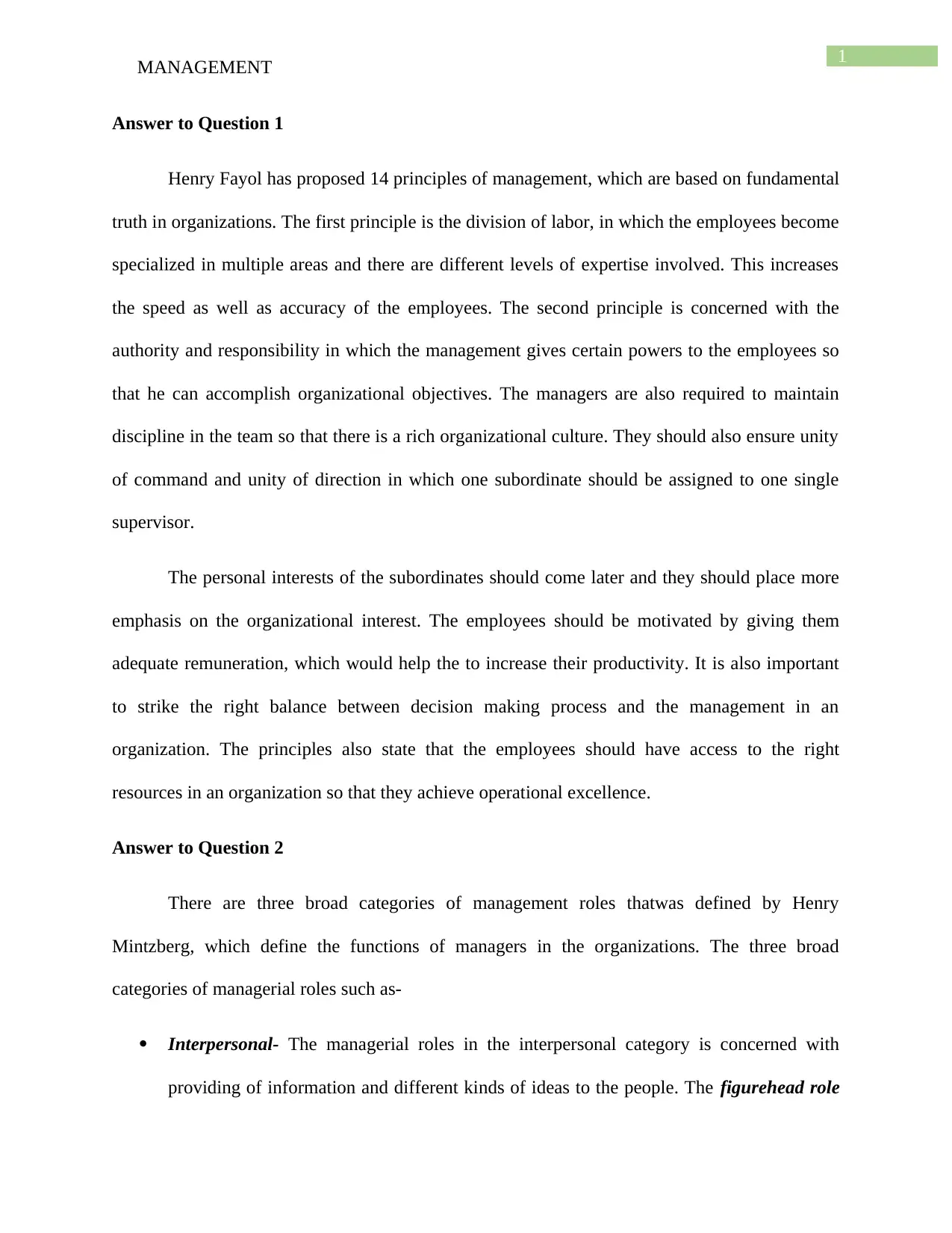
1
MANAGEMENT
Answer to Question 1
Henry Fayol has proposed 14 principles of management, which are based on fundamental
truth in organizations. The first principle is the division of labor, in which the employees become
specialized in multiple areas and there are different levels of expertise involved. This increases
the speed as well as accuracy of the employees. The second principle is concerned with the
authority and responsibility in which the management gives certain powers to the employees so
that he can accomplish organizational objectives. The managers are also required to maintain
discipline in the team so that there is a rich organizational culture. They should also ensure unity
of command and unity of direction in which one subordinate should be assigned to one single
supervisor.
The personal interests of the subordinates should come later and they should place more
emphasis on the organizational interest. The employees should be motivated by giving them
adequate remuneration, which would help the to increase their productivity. It is also important
to strike the right balance between decision making process and the management in an
organization. The principles also state that the employees should have access to the right
resources in an organization so that they achieve operational excellence.
Answer to Question 2
There are three broad categories of management roles thatwas defined by Henry
Mintzberg, which define the functions of managers in the organizations. The three broad
categories of managerial roles such as-
Interpersonal- The managerial roles in the interpersonal category is concerned with
providing of information and different kinds of ideas to the people. The figurehead role
MANAGEMENT
Answer to Question 1
Henry Fayol has proposed 14 principles of management, which are based on fundamental
truth in organizations. The first principle is the division of labor, in which the employees become
specialized in multiple areas and there are different levels of expertise involved. This increases
the speed as well as accuracy of the employees. The second principle is concerned with the
authority and responsibility in which the management gives certain powers to the employees so
that he can accomplish organizational objectives. The managers are also required to maintain
discipline in the team so that there is a rich organizational culture. They should also ensure unity
of command and unity of direction in which one subordinate should be assigned to one single
supervisor.
The personal interests of the subordinates should come later and they should place more
emphasis on the organizational interest. The employees should be motivated by giving them
adequate remuneration, which would help the to increase their productivity. It is also important
to strike the right balance between decision making process and the management in an
organization. The principles also state that the employees should have access to the right
resources in an organization so that they achieve operational excellence.
Answer to Question 2
There are three broad categories of management roles thatwas defined by Henry
Mintzberg, which define the functions of managers in the organizations. The three broad
categories of managerial roles such as-
Interpersonal- The managerial roles in the interpersonal category is concerned with
providing of information and different kinds of ideas to the people. The figurehead role
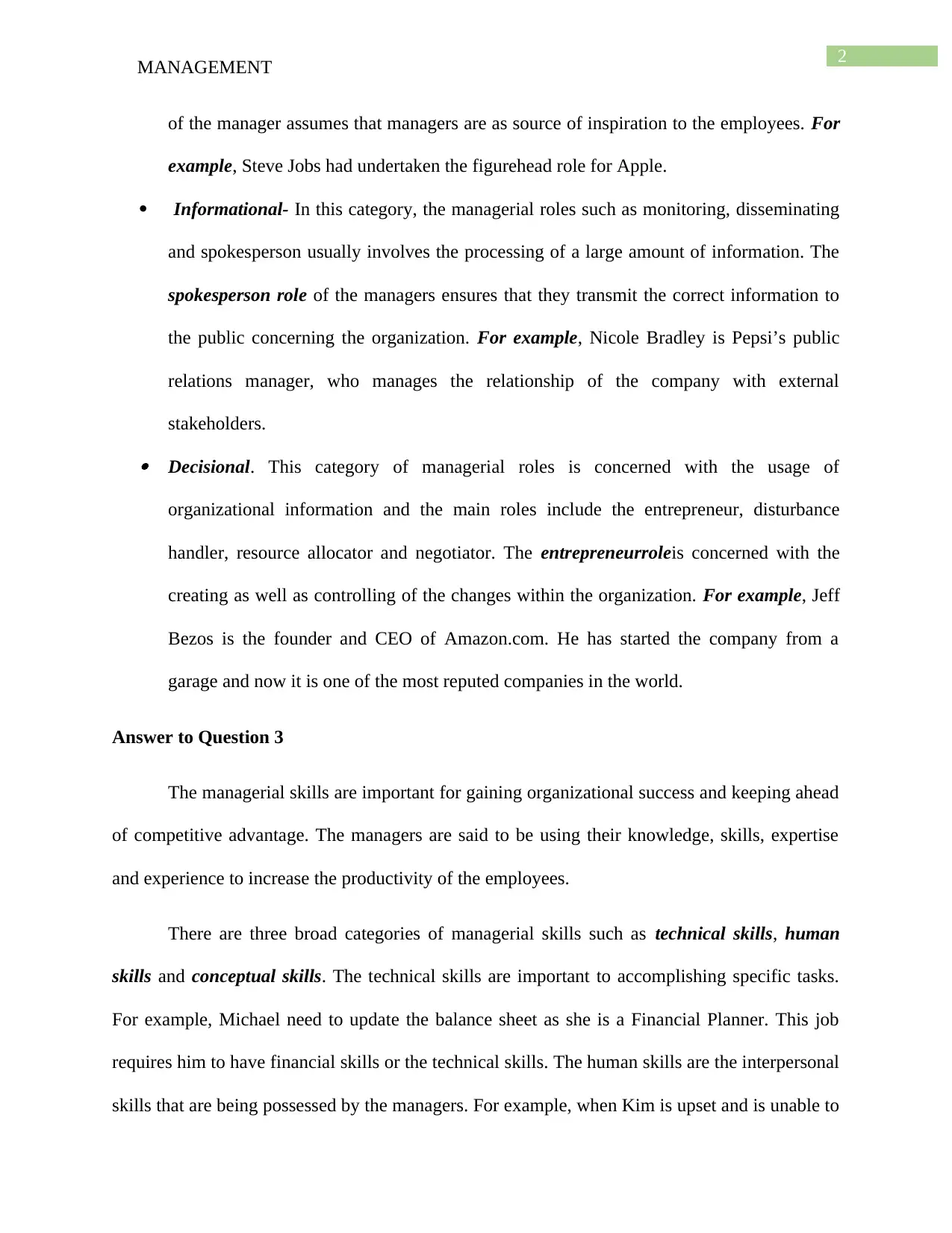
2
MANAGEMENT
of the manager assumes that managers are as source of inspiration to the employees. For
example, Steve Jobs had undertaken the figurehead role for Apple.
Informational- In this category, the managerial roles such as monitoring, disseminating
and spokesperson usually involves the processing of a large amount of information. The
spokesperson role of the managers ensures that they transmit the correct information to
the public concerning the organization. For example, Nicole Bradley is Pepsi’s public
relations manager, who manages the relationship of the company with external
stakeholders. Decisional. This category of managerial roles is concerned with the usage of
organizational information and the main roles include the entrepreneur, disturbance
handler, resource allocator and negotiator. The entrepreneurroleis concerned with the
creating as well as controlling of the changes within the organization. For example, Jeff
Bezos is the founder and CEO of Amazon.com. He has started the company from a
garage and now it is one of the most reputed companies in the world.
Answer to Question 3
The managerial skills are important for gaining organizational success and keeping ahead
of competitive advantage. The managers are said to be using their knowledge, skills, expertise
and experience to increase the productivity of the employees.
There are three broad categories of managerial skills such as technical skills, human
skills and conceptual skills. The technical skills are important to accomplishing specific tasks.
For example, Michael need to update the balance sheet as she is a Financial Planner. This job
requires him to have financial skills or the technical skills. The human skills are the interpersonal
skills that are being possessed by the managers. For example, when Kim is upset and is unable to
MANAGEMENT
of the manager assumes that managers are as source of inspiration to the employees. For
example, Steve Jobs had undertaken the figurehead role for Apple.
Informational- In this category, the managerial roles such as monitoring, disseminating
and spokesperson usually involves the processing of a large amount of information. The
spokesperson role of the managers ensures that they transmit the correct information to
the public concerning the organization. For example, Nicole Bradley is Pepsi’s public
relations manager, who manages the relationship of the company with external
stakeholders. Decisional. This category of managerial roles is concerned with the usage of
organizational information and the main roles include the entrepreneur, disturbance
handler, resource allocator and negotiator. The entrepreneurroleis concerned with the
creating as well as controlling of the changes within the organization. For example, Jeff
Bezos is the founder and CEO of Amazon.com. He has started the company from a
garage and now it is one of the most reputed companies in the world.
Answer to Question 3
The managerial skills are important for gaining organizational success and keeping ahead
of competitive advantage. The managers are said to be using their knowledge, skills, expertise
and experience to increase the productivity of the employees.
There are three broad categories of managerial skills such as technical skills, human
skills and conceptual skills. The technical skills are important to accomplishing specific tasks.
For example, Michael need to update the balance sheet as she is a Financial Planner. This job
requires him to have financial skills or the technical skills. The human skills are the interpersonal
skills that are being possessed by the managers. For example, when Kim is upset and is unable to
⊘ This is a preview!⊘
Do you want full access?
Subscribe today to unlock all pages.

Trusted by 1+ million students worldwide
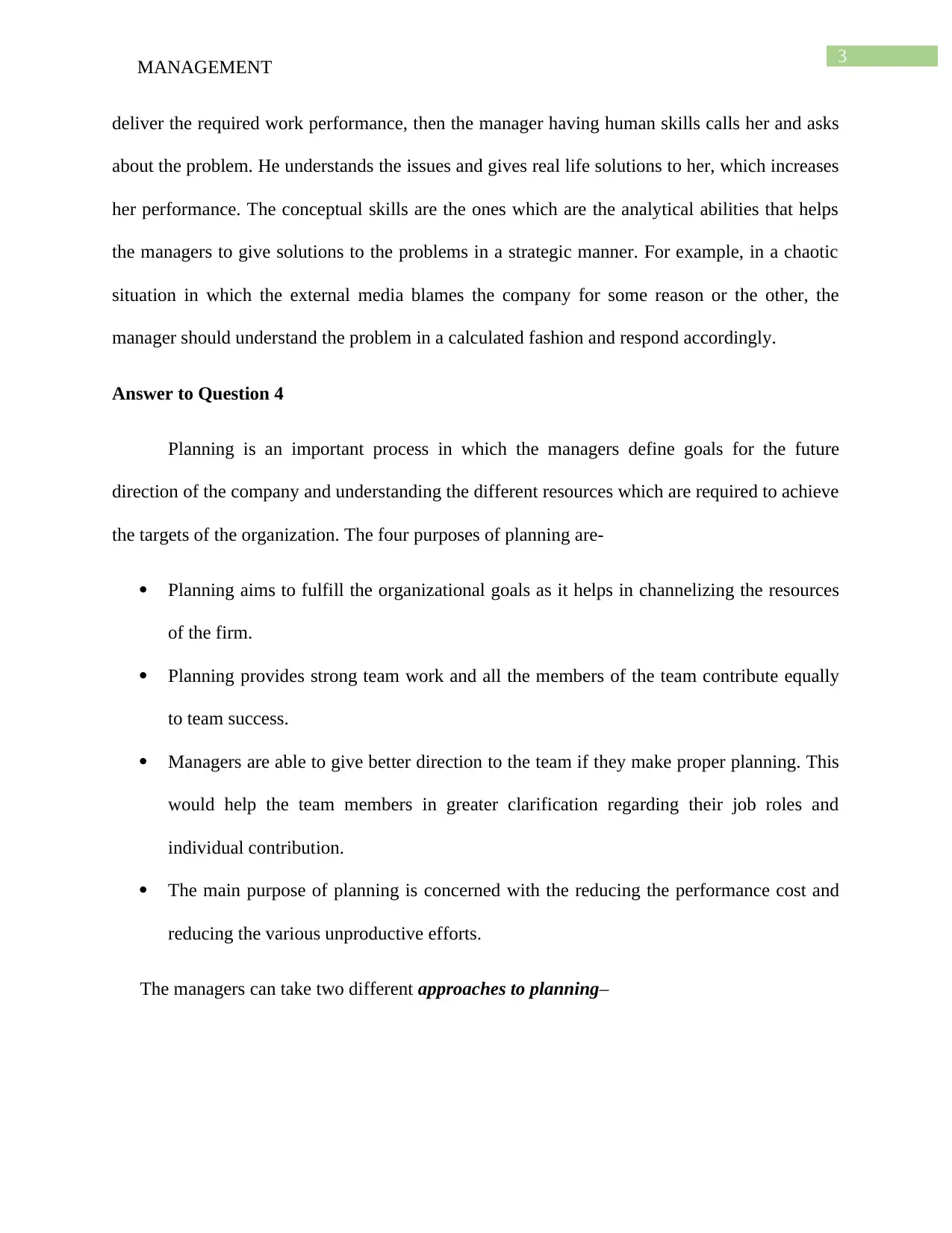
3
MANAGEMENT
deliver the required work performance, then the manager having human skills calls her and asks
about the problem. He understands the issues and gives real life solutions to her, which increases
her performance. The conceptual skills are the ones which are the analytical abilities that helps
the managers to give solutions to the problems in a strategic manner. For example, in a chaotic
situation in which the external media blames the company for some reason or the other, the
manager should understand the problem in a calculated fashion and respond accordingly.
Answer to Question 4
Planning is an important process in which the managers define goals for the future
direction of the company and understanding the different resources which are required to achieve
the targets of the organization. The four purposes of planning are-
Planning aims to fulfill the organizational goals as it helps in channelizing the resources
of the firm.
Planning provides strong team work and all the members of the team contribute equally
to team success.
Managers are able to give better direction to the team if they make proper planning. This
would help the team members in greater clarification regarding their job roles and
individual contribution.
The main purpose of planning is concerned with the reducing the performance cost and
reducing the various unproductive efforts.
The managers can take two different approaches to planning–
MANAGEMENT
deliver the required work performance, then the manager having human skills calls her and asks
about the problem. He understands the issues and gives real life solutions to her, which increases
her performance. The conceptual skills are the ones which are the analytical abilities that helps
the managers to give solutions to the problems in a strategic manner. For example, in a chaotic
situation in which the external media blames the company for some reason or the other, the
manager should understand the problem in a calculated fashion and respond accordingly.
Answer to Question 4
Planning is an important process in which the managers define goals for the future
direction of the company and understanding the different resources which are required to achieve
the targets of the organization. The four purposes of planning are-
Planning aims to fulfill the organizational goals as it helps in channelizing the resources
of the firm.
Planning provides strong team work and all the members of the team contribute equally
to team success.
Managers are able to give better direction to the team if they make proper planning. This
would help the team members in greater clarification regarding their job roles and
individual contribution.
The main purpose of planning is concerned with the reducing the performance cost and
reducing the various unproductive efforts.
The managers can take two different approaches to planning–
Paraphrase This Document
Need a fresh take? Get an instant paraphrase of this document with our AI Paraphraser
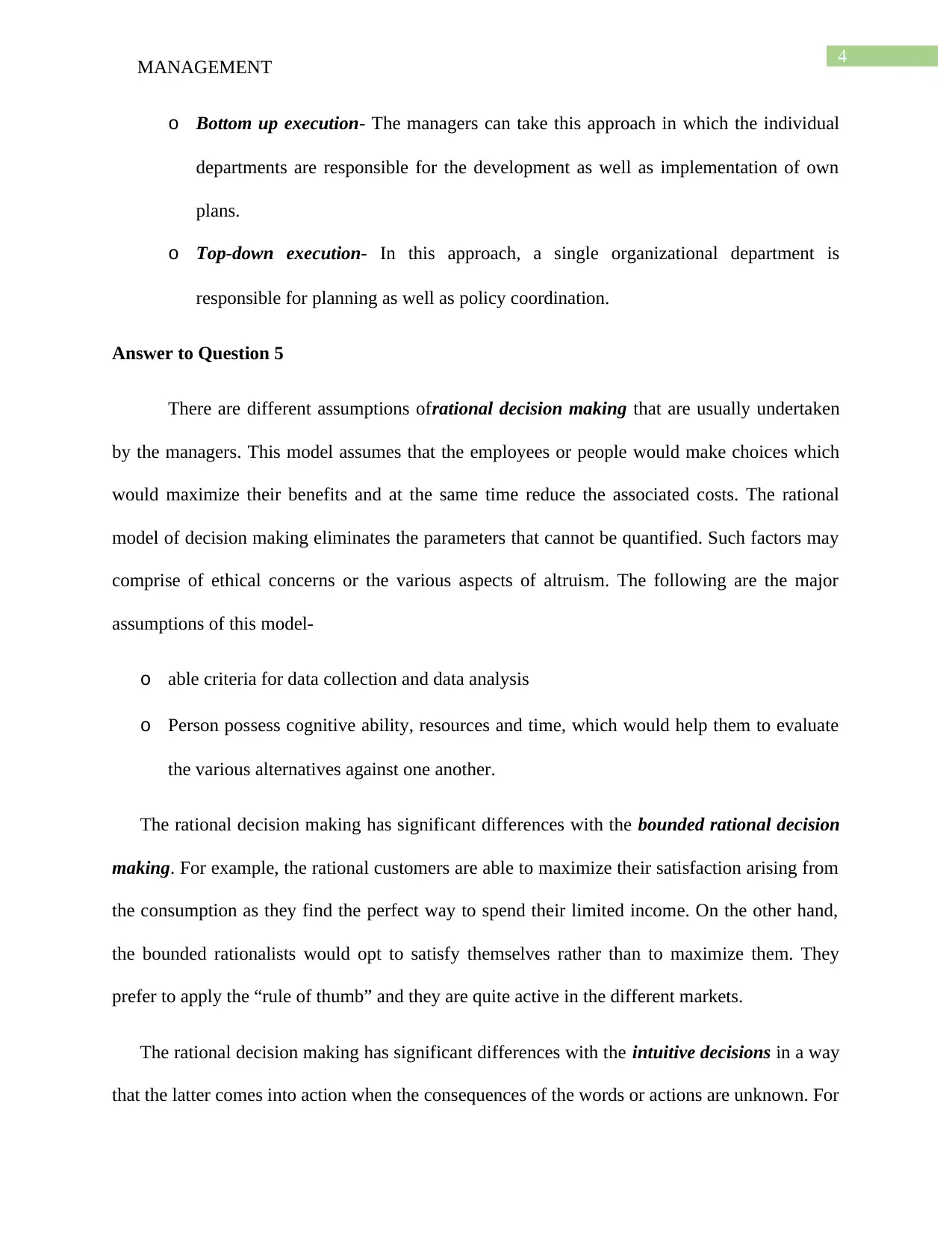
4
MANAGEMENT
o Bottom up execution- The managers can take this approach in which the individual
departments are responsible for the development as well as implementation of own
plans.
o Top-down execution- In this approach, a single organizational department is
responsible for planning as well as policy coordination.
Answer to Question 5
There are different assumptions ofrational decision making that are usually undertaken
by the managers. This model assumes that the employees or people would make choices which
would maximize their benefits and at the same time reduce the associated costs. The rational
model of decision making eliminates the parameters that cannot be quantified. Such factors may
comprise of ethical concerns or the various aspects of altruism. The following are the major
assumptions of this model-
o able criteria for data collection and data analysis
o Person possess cognitive ability, resources and time, which would help them to evaluate
the various alternatives against one another.
The rational decision making has significant differences with the bounded rational decision
making. For example, the rational customers are able to maximize their satisfaction arising from
the consumption as they find the perfect way to spend their limited income. On the other hand,
the bounded rationalists would opt to satisfy themselves rather than to maximize them. They
prefer to apply the “rule of thumb” and they are quite active in the different markets.
The rational decision making has significant differences with the intuitive decisions in a way
that the latter comes into action when the consequences of the words or actions are unknown. For
MANAGEMENT
o Bottom up execution- The managers can take this approach in which the individual
departments are responsible for the development as well as implementation of own
plans.
o Top-down execution- In this approach, a single organizational department is
responsible for planning as well as policy coordination.
Answer to Question 5
There are different assumptions ofrational decision making that are usually undertaken
by the managers. This model assumes that the employees or people would make choices which
would maximize their benefits and at the same time reduce the associated costs. The rational
model of decision making eliminates the parameters that cannot be quantified. Such factors may
comprise of ethical concerns or the various aspects of altruism. The following are the major
assumptions of this model-
o able criteria for data collection and data analysis
o Person possess cognitive ability, resources and time, which would help them to evaluate
the various alternatives against one another.
The rational decision making has significant differences with the bounded rational decision
making. For example, the rational customers are able to maximize their satisfaction arising from
the consumption as they find the perfect way to spend their limited income. On the other hand,
the bounded rationalists would opt to satisfy themselves rather than to maximize them. They
prefer to apply the “rule of thumb” and they are quite active in the different markets.
The rational decision making has significant differences with the intuitive decisions in a way
that the latter comes into action when the consequences of the words or actions are unknown. For
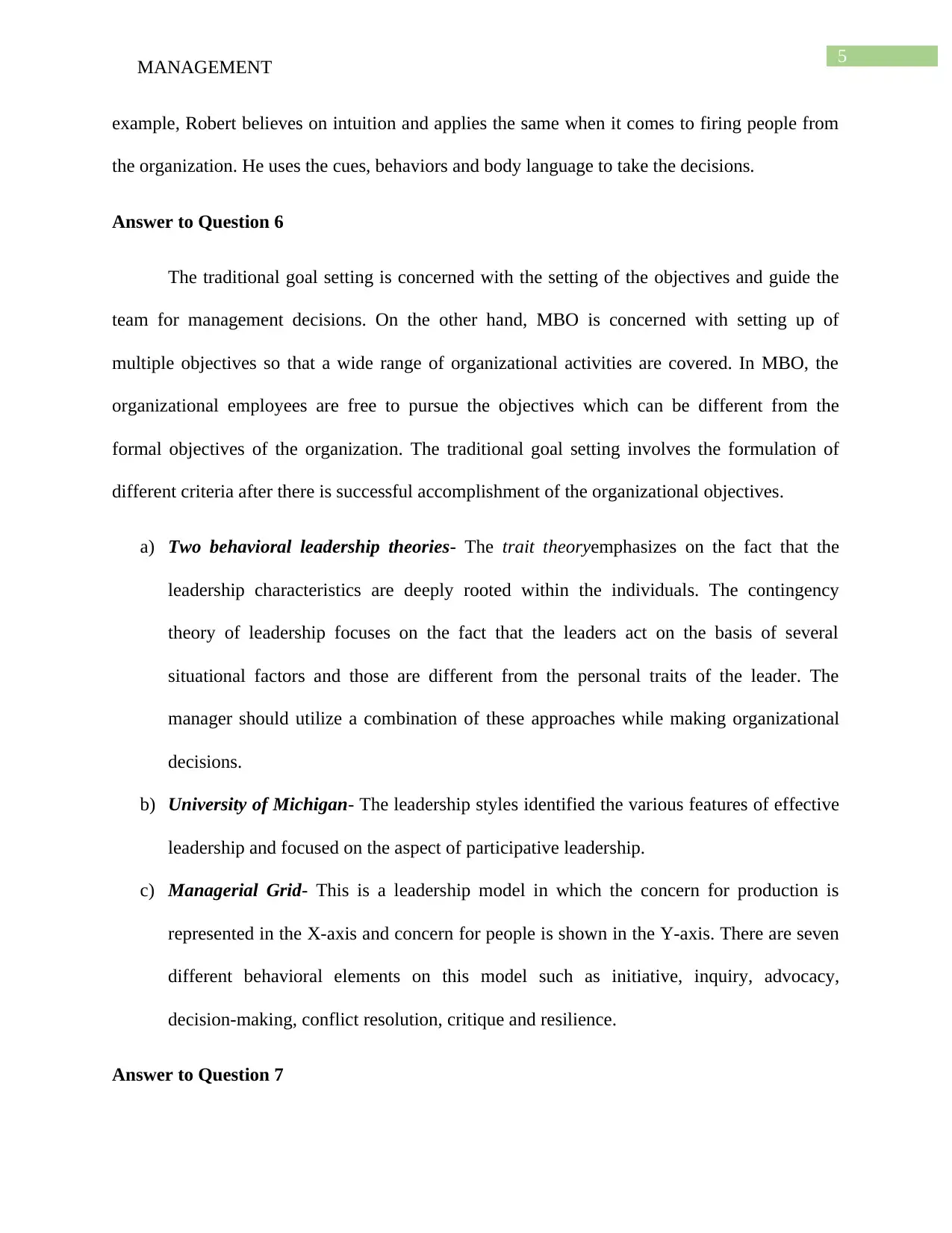
5
MANAGEMENT
example, Robert believes on intuition and applies the same when it comes to firing people from
the organization. He uses the cues, behaviors and body language to take the decisions.
Answer to Question 6
The traditional goal setting is concerned with the setting of the objectives and guide the
team for management decisions. On the other hand, MBO is concerned with setting up of
multiple objectives so that a wide range of organizational activities are covered. In MBO, the
organizational employees are free to pursue the objectives which can be different from the
formal objectives of the organization. The traditional goal setting involves the formulation of
different criteria after there is successful accomplishment of the organizational objectives.
a) Two behavioral leadership theories- The trait theoryemphasizes on the fact that the
leadership characteristics are deeply rooted within the individuals. The contingency
theory of leadership focuses on the fact that the leaders act on the basis of several
situational factors and those are different from the personal traits of the leader. The
manager should utilize a combination of these approaches while making organizational
decisions.
b) University of Michigan- The leadership styles identified the various features of effective
leadership and focused on the aspect of participative leadership.
c) Managerial Grid- This is a leadership model in which the concern for production is
represented in the X-axis and concern for people is shown in the Y-axis. There are seven
different behavioral elements on this model such as initiative, inquiry, advocacy,
decision-making, conflict resolution, critique and resilience.
Answer to Question 7
MANAGEMENT
example, Robert believes on intuition and applies the same when it comes to firing people from
the organization. He uses the cues, behaviors and body language to take the decisions.
Answer to Question 6
The traditional goal setting is concerned with the setting of the objectives and guide the
team for management decisions. On the other hand, MBO is concerned with setting up of
multiple objectives so that a wide range of organizational activities are covered. In MBO, the
organizational employees are free to pursue the objectives which can be different from the
formal objectives of the organization. The traditional goal setting involves the formulation of
different criteria after there is successful accomplishment of the organizational objectives.
a) Two behavioral leadership theories- The trait theoryemphasizes on the fact that the
leadership characteristics are deeply rooted within the individuals. The contingency
theory of leadership focuses on the fact that the leaders act on the basis of several
situational factors and those are different from the personal traits of the leader. The
manager should utilize a combination of these approaches while making organizational
decisions.
b) University of Michigan- The leadership styles identified the various features of effective
leadership and focused on the aspect of participative leadership.
c) Managerial Grid- This is a leadership model in which the concern for production is
represented in the X-axis and concern for people is shown in the Y-axis. There are seven
different behavioral elements on this model such as initiative, inquiry, advocacy,
decision-making, conflict resolution, critique and resilience.
Answer to Question 7
⊘ This is a preview!⊘
Do you want full access?
Subscribe today to unlock all pages.

Trusted by 1+ million students worldwide
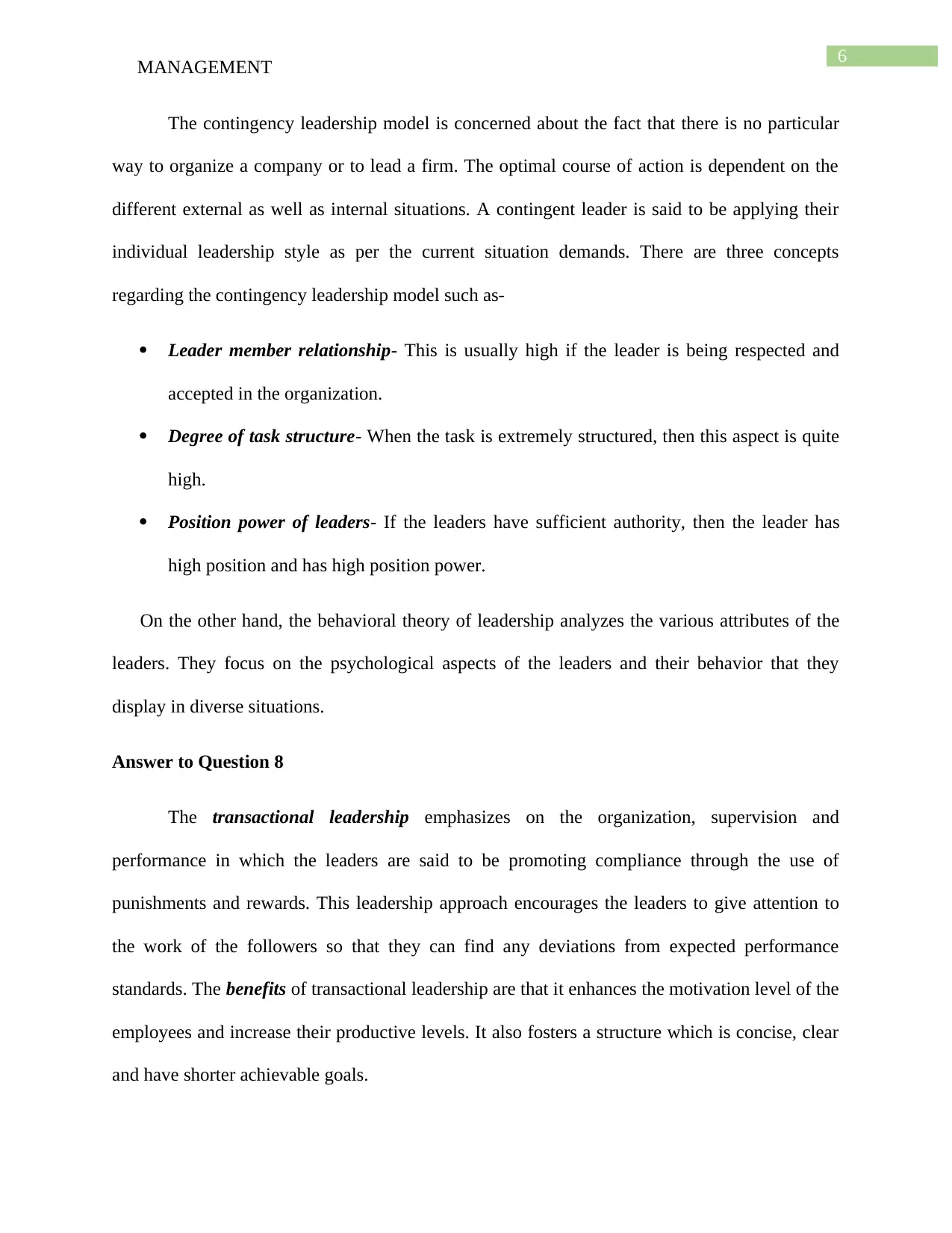
6
MANAGEMENT
The contingency leadership model is concerned about the fact that there is no particular
way to organize a company or to lead a firm. The optimal course of action is dependent on the
different external as well as internal situations. A contingent leader is said to be applying their
individual leadership style as per the current situation demands. There are three concepts
regarding the contingency leadership model such as-
Leader member relationship- This is usually high if the leader is being respected and
accepted in the organization.
Degree of task structure- When the task is extremely structured, then this aspect is quite
high.
Position power of leaders- If the leaders have sufficient authority, then the leader has
high position and has high position power.
On the other hand, the behavioral theory of leadership analyzes the various attributes of the
leaders. They focus on the psychological aspects of the leaders and their behavior that they
display in diverse situations.
Answer to Question 8
The transactional leadership emphasizes on the organization, supervision and
performance in which the leaders are said to be promoting compliance through the use of
punishments and rewards. This leadership approach encourages the leaders to give attention to
the work of the followers so that they can find any deviations from expected performance
standards. The benefits of transactional leadership are that it enhances the motivation level of the
employees and increase their productive levels. It also fosters a structure which is concise, clear
and have shorter achievable goals.
MANAGEMENT
The contingency leadership model is concerned about the fact that there is no particular
way to organize a company or to lead a firm. The optimal course of action is dependent on the
different external as well as internal situations. A contingent leader is said to be applying their
individual leadership style as per the current situation demands. There are three concepts
regarding the contingency leadership model such as-
Leader member relationship- This is usually high if the leader is being respected and
accepted in the organization.
Degree of task structure- When the task is extremely structured, then this aspect is quite
high.
Position power of leaders- If the leaders have sufficient authority, then the leader has
high position and has high position power.
On the other hand, the behavioral theory of leadership analyzes the various attributes of the
leaders. They focus on the psychological aspects of the leaders and their behavior that they
display in diverse situations.
Answer to Question 8
The transactional leadership emphasizes on the organization, supervision and
performance in which the leaders are said to be promoting compliance through the use of
punishments and rewards. This leadership approach encourages the leaders to give attention to
the work of the followers so that they can find any deviations from expected performance
standards. The benefits of transactional leadership are that it enhances the motivation level of the
employees and increase their productive levels. It also fosters a structure which is concise, clear
and have shorter achievable goals.
Paraphrase This Document
Need a fresh take? Get an instant paraphrase of this document with our AI Paraphraser
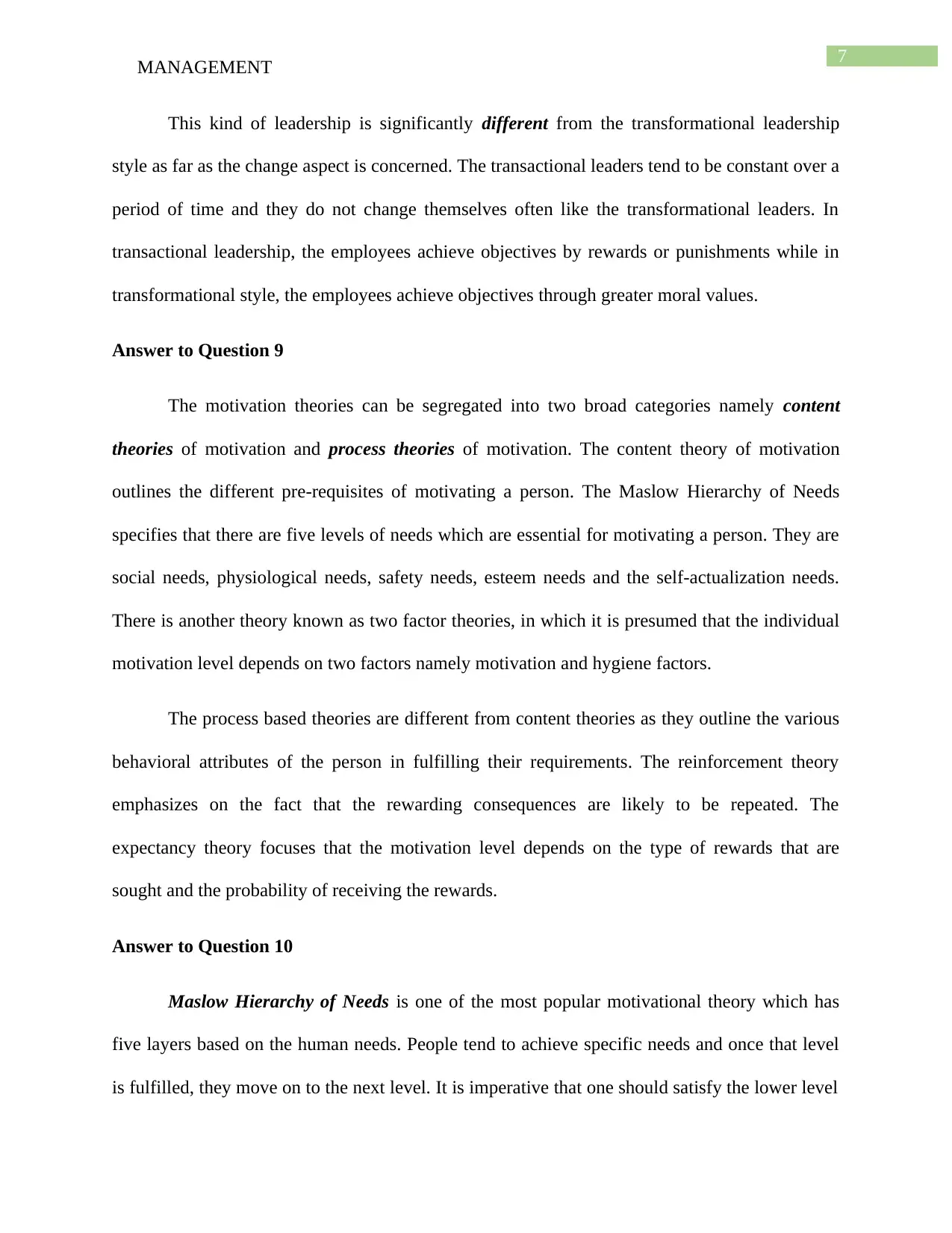
7
MANAGEMENT
This kind of leadership is significantly different from the transformational leadership
style as far as the change aspect is concerned. The transactional leaders tend to be constant over a
period of time and they do not change themselves often like the transformational leaders. In
transactional leadership, the employees achieve objectives by rewards or punishments while in
transformational style, the employees achieve objectives through greater moral values.
Answer to Question 9
The motivation theories can be segregated into two broad categories namely content
theories of motivation and process theories of motivation. The content theory of motivation
outlines the different pre-requisites of motivating a person. The Maslow Hierarchy of Needs
specifies that there are five levels of needs which are essential for motivating a person. They are
social needs, physiological needs, safety needs, esteem needs and the self-actualization needs.
There is another theory known as two factor theories, in which it is presumed that the individual
motivation level depends on two factors namely motivation and hygiene factors.
The process based theories are different from content theories as they outline the various
behavioral attributes of the person in fulfilling their requirements. The reinforcement theory
emphasizes on the fact that the rewarding consequences are likely to be repeated. The
expectancy theory focuses that the motivation level depends on the type of rewards that are
sought and the probability of receiving the rewards.
Answer to Question 10
Maslow Hierarchy of Needs is one of the most popular motivational theory which has
five layers based on the human needs. People tend to achieve specific needs and once that level
is fulfilled, they move on to the next level. It is imperative that one should satisfy the lower level
MANAGEMENT
This kind of leadership is significantly different from the transformational leadership
style as far as the change aspect is concerned. The transactional leaders tend to be constant over a
period of time and they do not change themselves often like the transformational leaders. In
transactional leadership, the employees achieve objectives by rewards or punishments while in
transformational style, the employees achieve objectives through greater moral values.
Answer to Question 9
The motivation theories can be segregated into two broad categories namely content
theories of motivation and process theories of motivation. The content theory of motivation
outlines the different pre-requisites of motivating a person. The Maslow Hierarchy of Needs
specifies that there are five levels of needs which are essential for motivating a person. They are
social needs, physiological needs, safety needs, esteem needs and the self-actualization needs.
There is another theory known as two factor theories, in which it is presumed that the individual
motivation level depends on two factors namely motivation and hygiene factors.
The process based theories are different from content theories as they outline the various
behavioral attributes of the person in fulfilling their requirements. The reinforcement theory
emphasizes on the fact that the rewarding consequences are likely to be repeated. The
expectancy theory focuses that the motivation level depends on the type of rewards that are
sought and the probability of receiving the rewards.
Answer to Question 10
Maslow Hierarchy of Needs is one of the most popular motivational theory which has
five layers based on the human needs. People tend to achieve specific needs and once that level
is fulfilled, they move on to the next level. It is imperative that one should satisfy the lower level
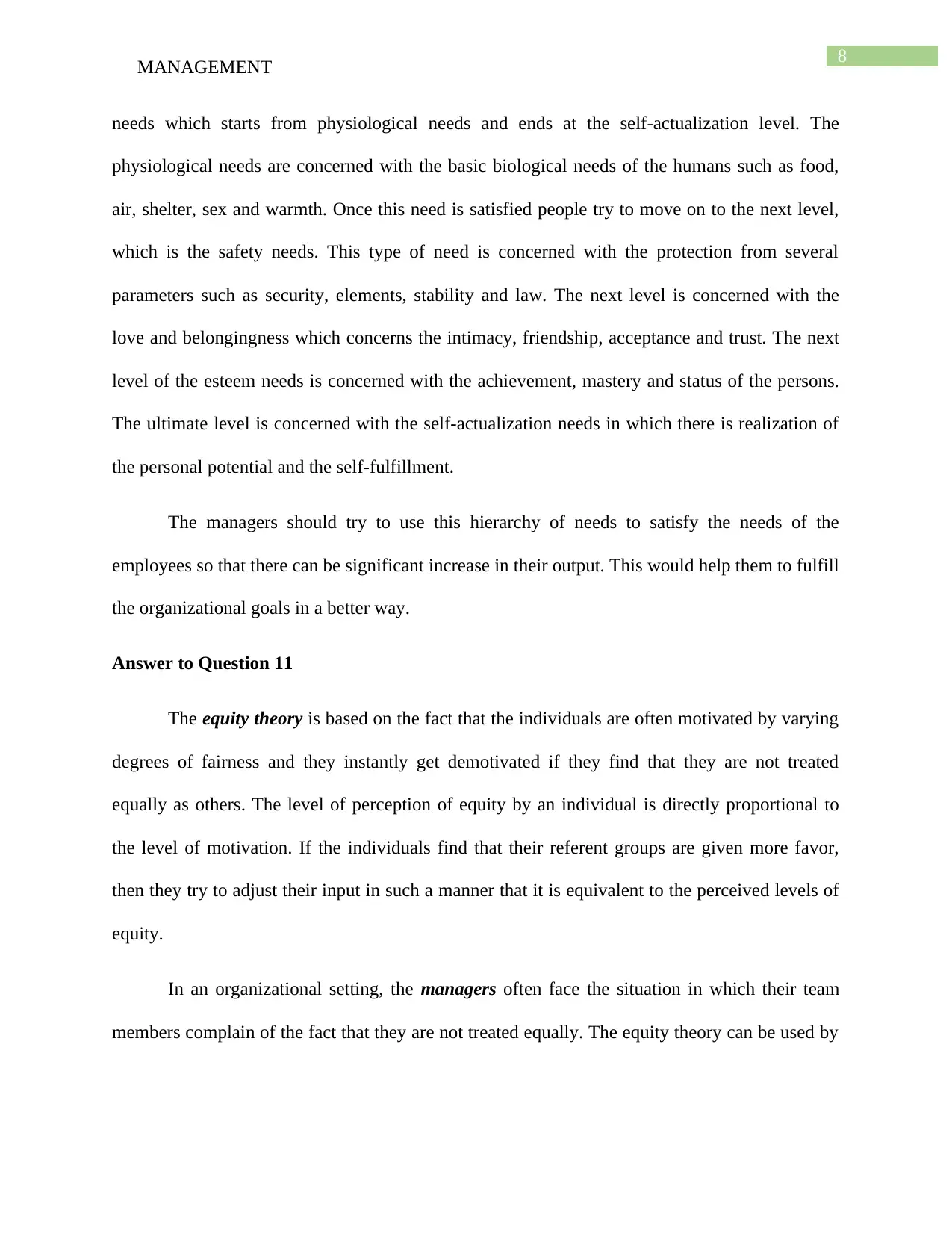
8
MANAGEMENT
needs which starts from physiological needs and ends at the self-actualization level. The
physiological needs are concerned with the basic biological needs of the humans such as food,
air, shelter, sex and warmth. Once this need is satisfied people try to move on to the next level,
which is the safety needs. This type of need is concerned with the protection from several
parameters such as security, elements, stability and law. The next level is concerned with the
love and belongingness which concerns the intimacy, friendship, acceptance and trust. The next
level of the esteem needs is concerned with the achievement, mastery and status of the persons.
The ultimate level is concerned with the self-actualization needs in which there is realization of
the personal potential and the self-fulfillment.
The managers should try to use this hierarchy of needs to satisfy the needs of the
employees so that there can be significant increase in their output. This would help them to fulfill
the organizational goals in a better way.
Answer to Question 11
The equity theory is based on the fact that the individuals are often motivated by varying
degrees of fairness and they instantly get demotivated if they find that they are not treated
equally as others. The level of perception of equity by an individual is directly proportional to
the level of motivation. If the individuals find that their referent groups are given more favor,
then they try to adjust their input in such a manner that it is equivalent to the perceived levels of
equity.
In an organizational setting, the managers often face the situation in which their team
members complain of the fact that they are not treated equally. The equity theory can be used by
MANAGEMENT
needs which starts from physiological needs and ends at the self-actualization level. The
physiological needs are concerned with the basic biological needs of the humans such as food,
air, shelter, sex and warmth. Once this need is satisfied people try to move on to the next level,
which is the safety needs. This type of need is concerned with the protection from several
parameters such as security, elements, stability and law. The next level is concerned with the
love and belongingness which concerns the intimacy, friendship, acceptance and trust. The next
level of the esteem needs is concerned with the achievement, mastery and status of the persons.
The ultimate level is concerned with the self-actualization needs in which there is realization of
the personal potential and the self-fulfillment.
The managers should try to use this hierarchy of needs to satisfy the needs of the
employees so that there can be significant increase in their output. This would help them to fulfill
the organizational goals in a better way.
Answer to Question 11
The equity theory is based on the fact that the individuals are often motivated by varying
degrees of fairness and they instantly get demotivated if they find that they are not treated
equally as others. The level of perception of equity by an individual is directly proportional to
the level of motivation. If the individuals find that their referent groups are given more favor,
then they try to adjust their input in such a manner that it is equivalent to the perceived levels of
equity.
In an organizational setting, the managers often face the situation in which their team
members complain of the fact that they are not treated equally. The equity theory can be used by
⊘ This is a preview!⊘
Do you want full access?
Subscribe today to unlock all pages.

Trusted by 1+ million students worldwide
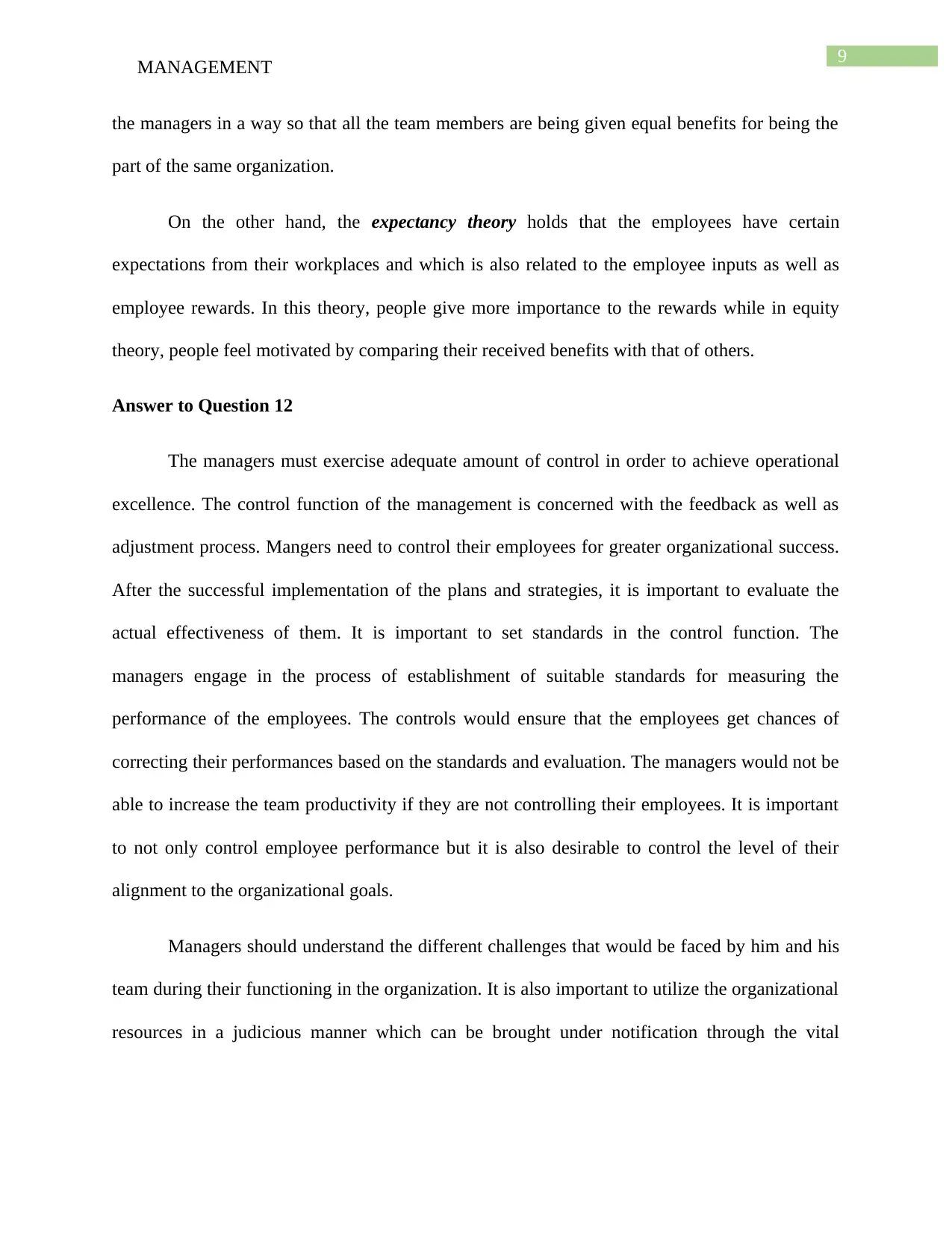
9
MANAGEMENT
the managers in a way so that all the team members are being given equal benefits for being the
part of the same organization.
On the other hand, the expectancy theory holds that the employees have certain
expectations from their workplaces and which is also related to the employee inputs as well as
employee rewards. In this theory, people give more importance to the rewards while in equity
theory, people feel motivated by comparing their received benefits with that of others.
Answer to Question 12
The managers must exercise adequate amount of control in order to achieve operational
excellence. The control function of the management is concerned with the feedback as well as
adjustment process. Mangers need to control their employees for greater organizational success.
After the successful implementation of the plans and strategies, it is important to evaluate the
actual effectiveness of them. It is important to set standards in the control function. The
managers engage in the process of establishment of suitable standards for measuring the
performance of the employees. The controls would ensure that the employees get chances of
correcting their performances based on the standards and evaluation. The managers would not be
able to increase the team productivity if they are not controlling their employees. It is important
to not only control employee performance but it is also desirable to control the level of their
alignment to the organizational goals.
Managers should understand the different challenges that would be faced by him and his
team during their functioning in the organization. It is also important to utilize the organizational
resources in a judicious manner which can be brought under notification through the vital
MANAGEMENT
the managers in a way so that all the team members are being given equal benefits for being the
part of the same organization.
On the other hand, the expectancy theory holds that the employees have certain
expectations from their workplaces and which is also related to the employee inputs as well as
employee rewards. In this theory, people give more importance to the rewards while in equity
theory, people feel motivated by comparing their received benefits with that of others.
Answer to Question 12
The managers must exercise adequate amount of control in order to achieve operational
excellence. The control function of the management is concerned with the feedback as well as
adjustment process. Mangers need to control their employees for greater organizational success.
After the successful implementation of the plans and strategies, it is important to evaluate the
actual effectiveness of them. It is important to set standards in the control function. The
managers engage in the process of establishment of suitable standards for measuring the
performance of the employees. The controls would ensure that the employees get chances of
correcting their performances based on the standards and evaluation. The managers would not be
able to increase the team productivity if they are not controlling their employees. It is important
to not only control employee performance but it is also desirable to control the level of their
alignment to the organizational goals.
Managers should understand the different challenges that would be faced by him and his
team during their functioning in the organization. It is also important to utilize the organizational
resources in a judicious manner which can be brought under notification through the vital
Paraphrase This Document
Need a fresh take? Get an instant paraphrase of this document with our AI Paraphraser
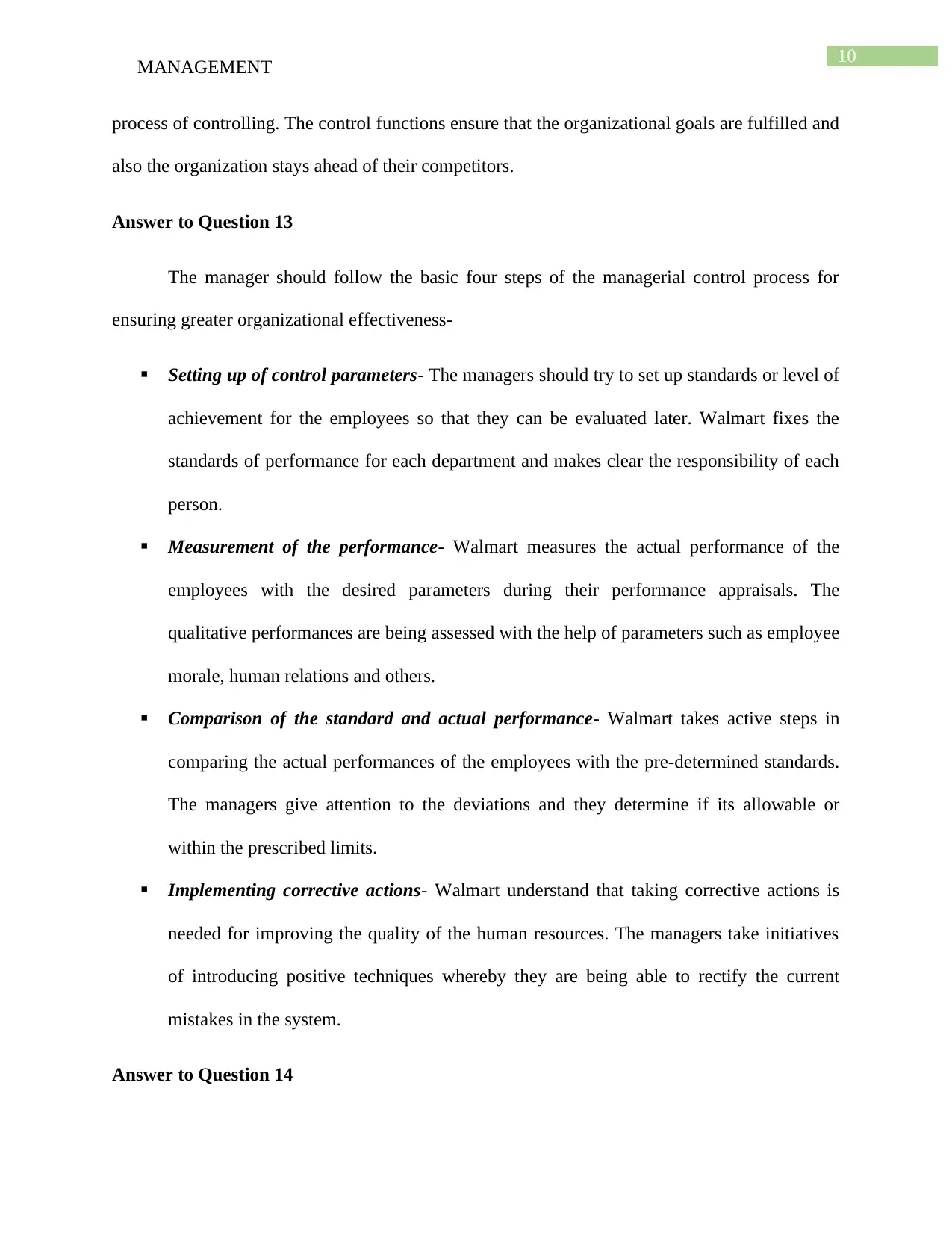
10
MANAGEMENT
process of controlling. The control functions ensure that the organizational goals are fulfilled and
also the organization stays ahead of their competitors.
Answer to Question 13
The manager should follow the basic four steps of the managerial control process for
ensuring greater organizational effectiveness-
Setting up of control parameters- The managers should try to set up standards or level of
achievement for the employees so that they can be evaluated later. Walmart fixes the
standards of performance for each department and makes clear the responsibility of each
person.
Measurement of the performance- Walmart measures the actual performance of the
employees with the desired parameters during their performance appraisals. The
qualitative performances are being assessed with the help of parameters such as employee
morale, human relations and others.
Comparison of the standard and actual performance- Walmart takes active steps in
comparing the actual performances of the employees with the pre-determined standards.
The managers give attention to the deviations and they determine if its allowable or
within the prescribed limits.
Implementing corrective actions- Walmart understand that taking corrective actions is
needed for improving the quality of the human resources. The managers take initiatives
of introducing positive techniques whereby they are being able to rectify the current
mistakes in the system.
Answer to Question 14
MANAGEMENT
process of controlling. The control functions ensure that the organizational goals are fulfilled and
also the organization stays ahead of their competitors.
Answer to Question 13
The manager should follow the basic four steps of the managerial control process for
ensuring greater organizational effectiveness-
Setting up of control parameters- The managers should try to set up standards or level of
achievement for the employees so that they can be evaluated later. Walmart fixes the
standards of performance for each department and makes clear the responsibility of each
person.
Measurement of the performance- Walmart measures the actual performance of the
employees with the desired parameters during their performance appraisals. The
qualitative performances are being assessed with the help of parameters such as employee
morale, human relations and others.
Comparison of the standard and actual performance- Walmart takes active steps in
comparing the actual performances of the employees with the pre-determined standards.
The managers give attention to the deviations and they determine if its allowable or
within the prescribed limits.
Implementing corrective actions- Walmart understand that taking corrective actions is
needed for improving the quality of the human resources. The managers take initiatives
of introducing positive techniques whereby they are being able to rectify the current
mistakes in the system.
Answer to Question 14
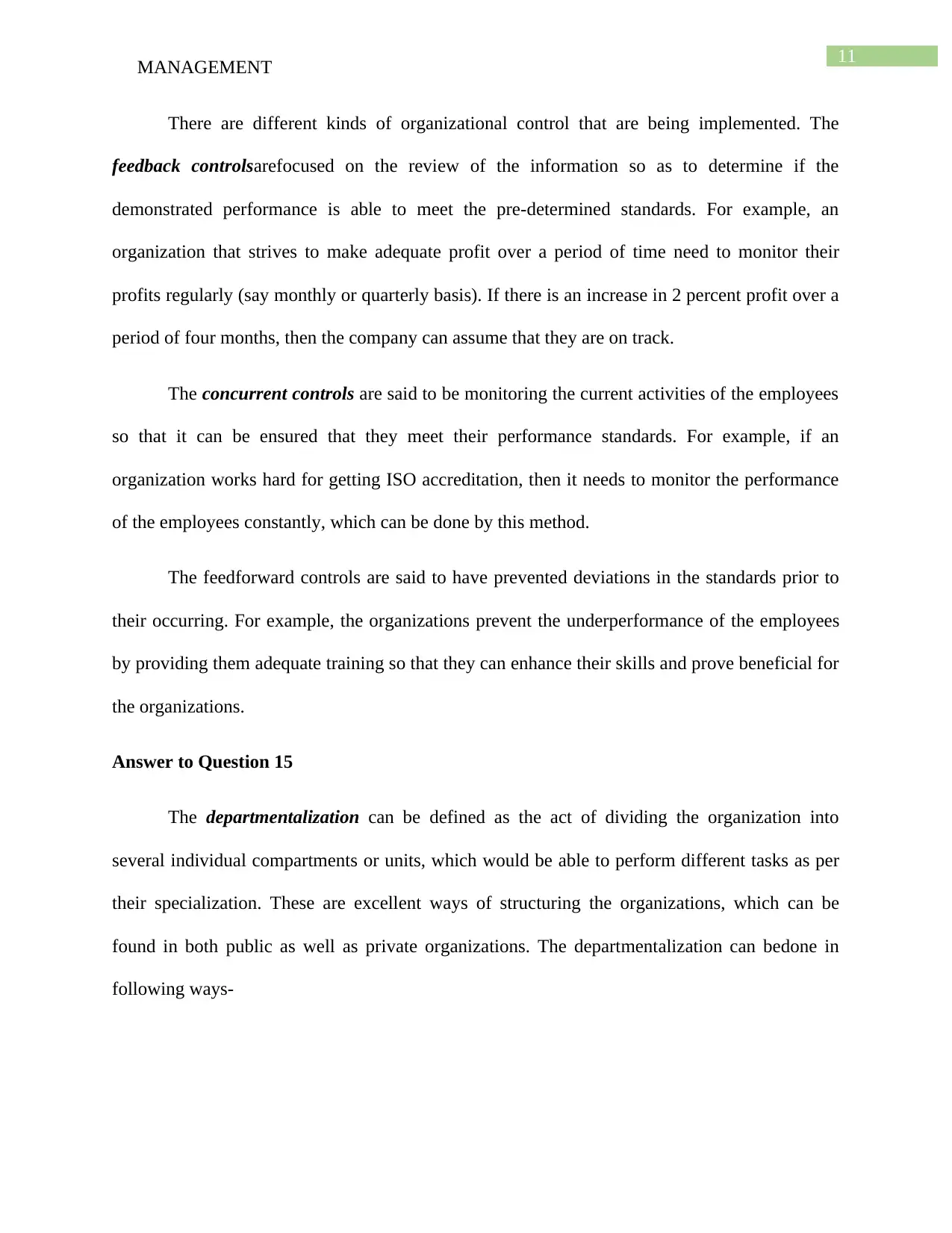
11
MANAGEMENT
There are different kinds of organizational control that are being implemented. The
feedback controlsarefocused on the review of the information so as to determine if the
demonstrated performance is able to meet the pre-determined standards. For example, an
organization that strives to make adequate profit over a period of time need to monitor their
profits regularly (say monthly or quarterly basis). If there is an increase in 2 percent profit over a
period of four months, then the company can assume that they are on track.
The concurrent controls are said to be monitoring the current activities of the employees
so that it can be ensured that they meet their performance standards. For example, if an
organization works hard for getting ISO accreditation, then it needs to monitor the performance
of the employees constantly, which can be done by this method.
The feedforward controls are said to have prevented deviations in the standards prior to
their occurring. For example, the organizations prevent the underperformance of the employees
by providing them adequate training so that they can enhance their skills and prove beneficial for
the organizations.
Answer to Question 15
The departmentalization can be defined as the act of dividing the organization into
several individual compartments or units, which would be able to perform different tasks as per
their specialization. These are excellent ways of structuring the organizations, which can be
found in both public as well as private organizations. The departmentalization can bedone in
following ways-
MANAGEMENT
There are different kinds of organizational control that are being implemented. The
feedback controlsarefocused on the review of the information so as to determine if the
demonstrated performance is able to meet the pre-determined standards. For example, an
organization that strives to make adequate profit over a period of time need to monitor their
profits regularly (say monthly or quarterly basis). If there is an increase in 2 percent profit over a
period of four months, then the company can assume that they are on track.
The concurrent controls are said to be monitoring the current activities of the employees
so that it can be ensured that they meet their performance standards. For example, if an
organization works hard for getting ISO accreditation, then it needs to monitor the performance
of the employees constantly, which can be done by this method.
The feedforward controls are said to have prevented deviations in the standards prior to
their occurring. For example, the organizations prevent the underperformance of the employees
by providing them adequate training so that they can enhance their skills and prove beneficial for
the organizations.
Answer to Question 15
The departmentalization can be defined as the act of dividing the organization into
several individual compartments or units, which would be able to perform different tasks as per
their specialization. These are excellent ways of structuring the organizations, which can be
found in both public as well as private organizations. The departmentalization can bedone in
following ways-
⊘ This is a preview!⊘
Do you want full access?
Subscribe today to unlock all pages.

Trusted by 1+ million students worldwide
1 out of 23
Related Documents
Your All-in-One AI-Powered Toolkit for Academic Success.
+13062052269
info@desklib.com
Available 24*7 on WhatsApp / Email
![[object Object]](/_next/static/media/star-bottom.7253800d.svg)
Unlock your academic potential
Copyright © 2020–2026 A2Z Services. All Rights Reserved. Developed and managed by ZUCOL.



